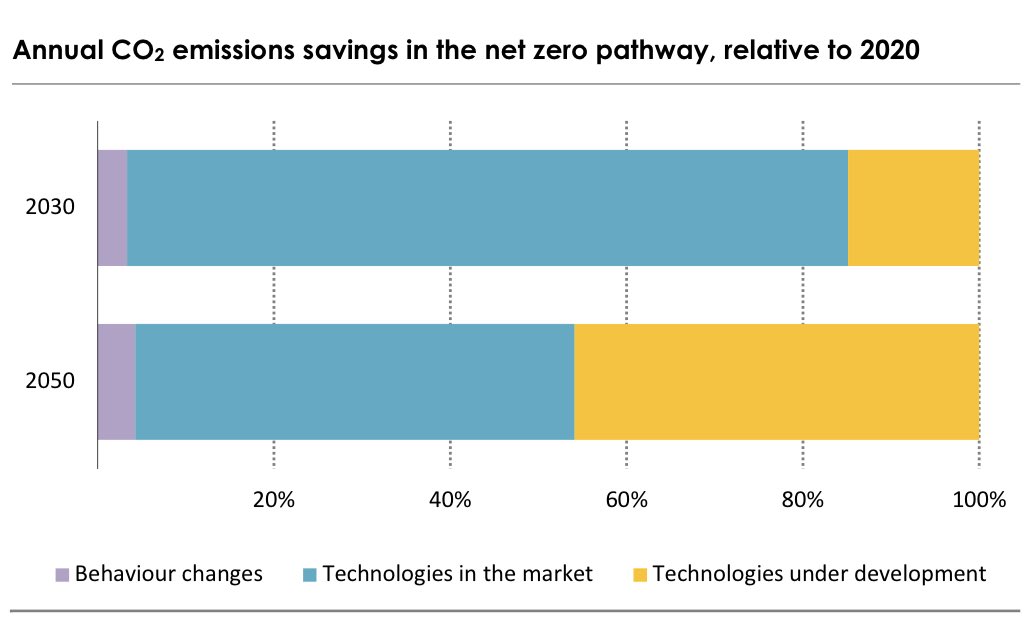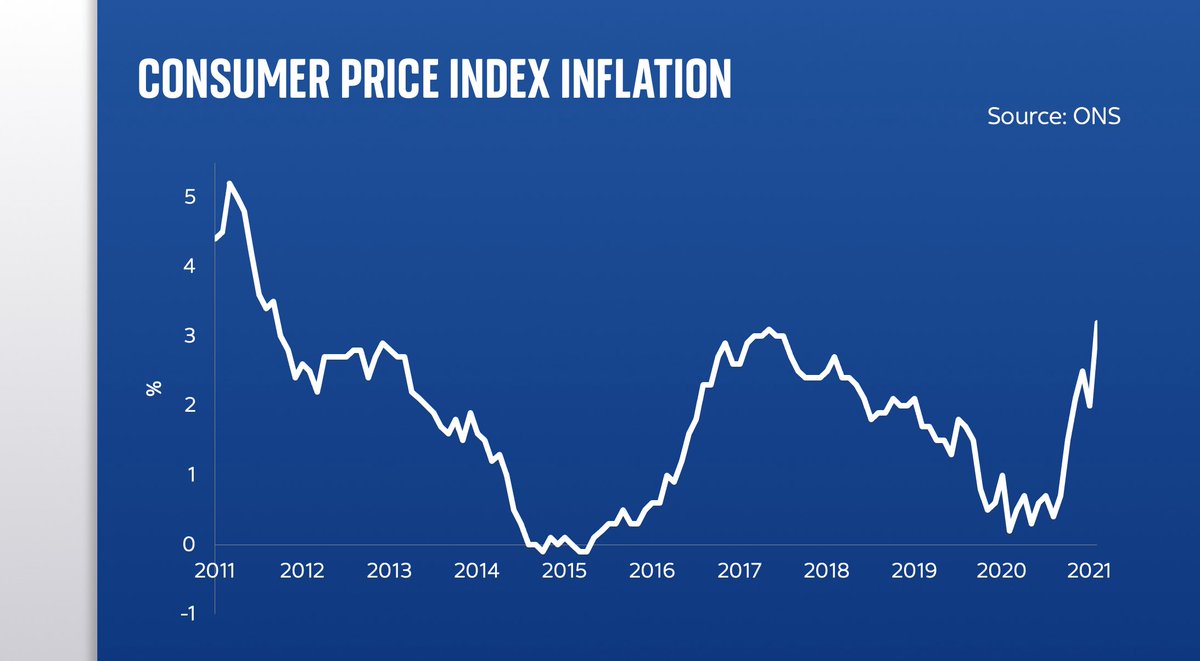
Here’s a thread abt a few of the most important things you need to know about getting to net zero and eliminating carbon emissions, but before we get stuck in let’s begin with a question.
How much do you suppose governments around the world are spending on research into energy?
How much do you suppose governments around the world are spending on research into energy?
If you’re anything like me you’re probably assuming they’re spending more than ever before. After all, they say they’re serious about averting climate change. They’ve pledged to eliminate emissions by 2050, right? And to do that we’re going to need serious tech breakthroughs…
This is an @IEA chart that underlines that need for tech breakthroughs. These bars show you how the world eliminates CO2 emissions by 2050. The key thing to focus on is the yellow bit.
Nearly HALF of all the emissions reductions are due to “technologies under development”
Nearly HALF of all the emissions reductions are due to “technologies under development”

In other words, we are counting, BIG TIME, on new inventions and the scaling up of prototypes of green energy technology to get us over the line. So, back to that initial question. Surely govts around the developed world are spending decent amounts on energy R&D, right?
Wrong. This chart shows you the amount spent by developed nation governments (eg the OECD) on research into energy. In other words the v thing we need to research right now to transition to greener energy.
It is CONSIDERABLY lower today than it was for most of the 1970s and ‘80s.
It is CONSIDERABLY lower today than it was for most of the 1970s and ‘80s.

But ah, you’re prob thinking: ah but wasn’t a lot of that 👆R&D being spent on fossil fuels? Eg to shift away from expensive gulf oil following the 1970s energy shock? Well yes partly.
But even spending on RENEWABLE energy R&D is lower today than in the early 80s or a decade ago
But even spending on RENEWABLE energy R&D is lower today than in the early 80s or a decade ago

Sidenote: if you’re wondering why it is nuclear power is quite so expensive these days and the tech has barely improved since the 1970s, perhaps this chart might hold some of the clues. We’ve literally spent less and less on it as time has gone on. 

Anyway, back to this chart. Let’s consider one of the technologies which promises to get us down to net zero, yet is still in the yellow zone.
It’s a technology that’s considered crucial and controversial in equal measure. But is discussed surprisingly rarely: Carbon capture.
It’s a technology that’s considered crucial and controversial in equal measure. But is discussed surprisingly rarely: Carbon capture.

Over the past month or two I’ve done a deep dive into carbon capture and storage (CCS). I’ve made a @skynews film and written a long read (links coming up soon). I think it’s one of the most important environmental and economic stories of the century. Why?
Because without it we’re in big trouble.
A while back @theCCCuk mapped out the five likeliest routes to net zero.
EVERY SINGLE ONE of these five scenarios relied on carbon capture to get down to net zero. Yet here’s the thing: this tech hasn’t ever been deployed at scale.
A while back @theCCCuk mapped out the five likeliest routes to net zero.
EVERY SINGLE ONE of these five scenarios relied on carbon capture to get down to net zero. Yet here’s the thing: this tech hasn’t ever been deployed at scale.

We travelled the UK making our film.
There are lots of promising CCS sites. Up in St Fergus, Aberdeenshire, these pipes (hard hat alert) could play a big part.
The first is the pipe bringing in gas from the N Sea. The second is where we could send carbon back underground.

There are lots of promising CCS sites. Up in St Fergus, Aberdeenshire, these pipes (hard hat alert) could play a big part.
The first is the pipe bringing in gas from the N Sea. The second is where we could send carbon back underground.


The idea is that in much the same way as we capture other nasty acid-rain causing gases from factory and power station chimneys, we could capture carbon and put it under the ground, through pipes like those👆. UK has lots of depleted oil/gas fields thus lots of places to put it. 

On the one hand, there’s nothing esp new about this technology. We’ve been capturing gases from fumes for the best part of a century. And carbon capture is already being used in fertiliser production and, in some countries, to purify natural gas before it goes into the grid.
And while there’s a cost involved (both to build the rigs and an energy cost to run them) there are exciting new technologies which promise to make carbon capture more economical. This blue rig from @carbonsolu does the same work the enormous old rig behind it did. V promising. 

Put it all together and you could make a compelling case that carbon capture (and direct air capture - where carbon is removed from the air) could help solve climate change. And the UK, with its North Sea and offshore expertise, could lead the pack.
Btw UK’s hopes to develop a carbon zero hydrogen sector are also largely dependent on CCS. Since you need CCS to make “blue hydrogen”, which is hydrogen made from natural gas, but with the carbon removed. Truly green hydrogen is still some way off (at least at scale). From CCC: 

But here’s the thing: carbon capture has also never been done at scale. There are a few pilot projects around the world. Some have been moderately successful. But others have been disappointing. This piece from @ChrisGoodall2 tells the story of two of them carboncommentary.com/blog/2021/7/30…
Travel the country, as I have recent weeks, and you encounter the ghosts of CCS past. Old sites which once promised to be the future.
Longannet coal-fired power station. Big CCS trial. Cancelled 2011.
Peterhead gas-fired power station. CCS trial cancelled 2015.
There are others.

Longannet coal-fired power station. Big CCS trial. Cancelled 2011.
Peterhead gas-fired power station. CCS trial cancelled 2015.
There are others.


Why hasn’t CCS ever happened at scale? There are technical issues (see what’s happened at Gorgon & In Salah). There are social obstacles: many are understandably sceptical. Why, they ask with some reason, are we supporting tech that will allow the further burning of fossil fuels?
The short answer, say those modelling the energy transition, is we simply won’t ever get there if we force people to sacrifice their lifestyles. And getting there will be FAR harder if we don’t use energy-dense fuels to help us BUILD the solar panels/wind turbines we need.
Plus another point which is too rarely discussed is that green energy technologies - solar panels, carbon fibre wind turbines, batteries - are actually create MORE emissions, pound for pound, than making steel or cement or burning coal or gas. Really!
However, the MAIN reason CCS hasn’t yet happened almost certainly comes back to economics (which is why I, an economics journalist, am banging on about it). Yup. It’s about INCENTIVES. Right now there’s no real incentive for a cement plant or power station to capture carbon.
So if this tech is going to work two things need to happen: 1. We need to put a price on carbon, either through a tax or some other set of mechanisms. That incentivises people to stop emitting it. 2. Govt needs to step up and INVEST both in grants and technology to make it happen
The news here is tentatively encouraging. This week BEIS is poised to announce funding for new CCS projects around the UK. There will be other big promises in Glasgow. That’s great and all. But until the line on this chart starts going up it’s hard to take it all seriously. 

If you’re interested in this you could do worse than follow @DrSimEvans and his colleagues at Carbon Brief who’ve been doing lots of work on CCS etc for years. A selection: carbonbrief.org/beccs-the-stor…
carbonbrief.org/absence-carbon…
carbonbrief.org/guest-post-lea…
carbonbrief.org/in-depth-qa-ho…
carbonbrief.org/absence-carbon…
carbonbrief.org/guest-post-lea…
carbonbrief.org/in-depth-qa-ho…
I'll post a link to the short film and the long read when they're up online - and you can see more on this on @skynews over the next 24 hours. In the meantime here's a news story based on our conversation with @ChiefExecCCC news.sky.com/story/climate-…
Fair question - of course it counts.
But a) govt shd provide leadership; falling R&D energy spending seems an odd signal.
b) with CCS in particular there’s evidence of market failure, & a need for govt to shape incentives
C) annoyingly @IEA doesn’t publish full private R&D figs
But a) govt shd provide leadership; falling R&D energy spending seems an odd signal.
b) with CCS in particular there’s evidence of market failure, & a need for govt to shape incentives
C) annoyingly @IEA doesn’t publish full private R&D figs
https://twitter.com/martinald/status/1450090658421788676
Yes GDP has gone up a lot.
But generally when gauging a govt’s priorities we tend to look at spending as a % of GDP or of total expenditure and on both measures it’s down a lot since 1980.
In fact, in pure inflation adjusted cash terms we’re still spending less than in 1980
But generally when gauging a govt’s priorities we tend to look at spending as a % of GDP or of total expenditure and on both measures it’s down a lot since 1980.
In fact, in pure inflation adjusted cash terms we’re still spending less than in 1980
https://twitter.com/tahewett/status/1450091455259701251
LONG READ: Carbon capture will supposedly help save the planet.
Every leading plan to achieve net zero depends on it.
So why is this technology taking so long to become a scaled-up reality?
A look at the most important issue too few people are talking abt:
news.sky.com/story/the-uks-…
Every leading plan to achieve net zero depends on it.
So why is this technology taking so long to become a scaled-up reality?
A look at the most important issue too few people are talking abt:
news.sky.com/story/the-uks-…
It’s one of the most important technologies in the race to net zero.🌎
Yet it’s one of the least discussed.
I’ve travelled the UK visiting the sites promising to make CARBON CAPTURE a reality…
and the sites that promised the same thing years ago. VIDEO:
Yet it’s one of the least discussed.
I’ve travelled the UK visiting the sites promising to make CARBON CAPTURE a reality…
and the sites that promised the same thing years ago. VIDEO:
• • •
Missing some Tweet in this thread? You can try to
force a refresh
















